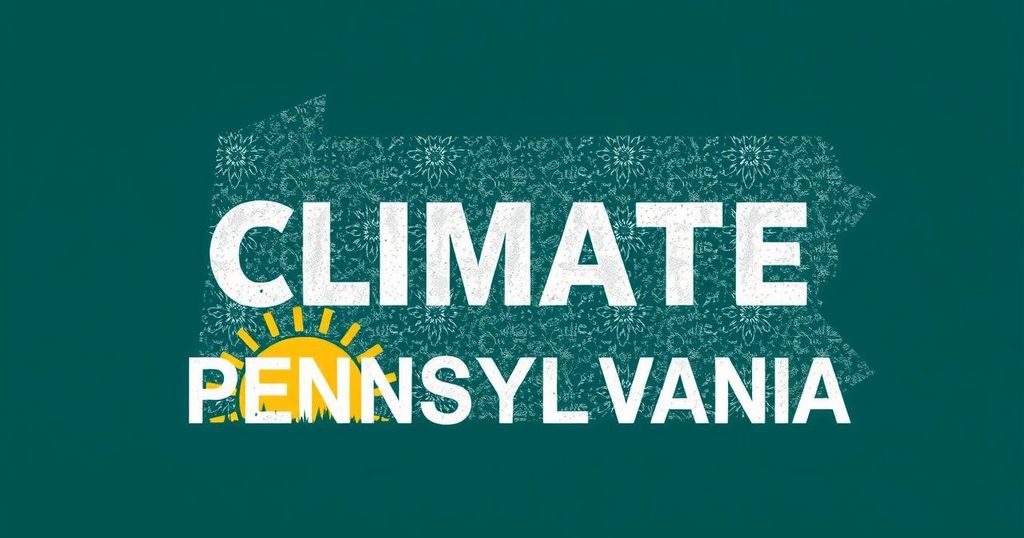Examining Climate Issues in the Pennsylvania Senate Race
The Pennsylvania Senate race features Democratic incumbent Bob Casey and Republican challenger Dave McCormick, with climate change and energy policy playing a significant role. Casey supports investment in clean energy and responsible fracking, while McCormick acknowledges climate reality but favors increased fracking and reduced regulations. Voter concerns lean towards jobs and inflation, though younger voters are pressing for stronger climate commitments. Both candidates support nuclear energy, highlighting a need for greater attention to renewable investments in Pennsylvania’s energy future.
The Pennsylvania Senate race is currently a focal point in the context of control over the U.S. Senate, with Democratic incumbent Senator Bob Casey running for a fourth term against Republican challenger Dave McCormick. As elections approach, the significance of climate and environmental stances has become increasingly pertinent. Reporter Kiley Bense, of Inside Climate News, provided insights into the candidates’ positions regarding climate issues during a recent discussion. Senator Bob Casey has developed a more climate-conscious approach in recent years, notably supporting the Inflation Reduction Act. He emphasizes the need for investment in clean energy to combat climate change, while maintaining a stance that advocates for what he terms “responsible fracking.” In contrast, Dave McCormick adopts a more nuanced position, acknowledging the reality of climate change but advocating for increased fracking and a rollback of regulations to boost oil and gas production in Pennsylvania. The issue of fracking is particularly critical in Pennsylvania, where it has sparked considerable debate. McCormick has linked Casey to Vice President Kamala Harris’s comments on fracking, despite Casey’s consistent support for the practice under the premise of safety and regulation. Although Casey has endorsed the FRAC Act to enhance disclosure around fracking practices, environmentalists argue that the actual policies have not sufficiently regulated the industry. Despite Casey’s strong environmental record, climate change does not rank highly on the priority list for many Pennsylvania voters, who are more focused on issues such as jobs, inflation, and reproductive rights. Young voters show a strong interest in climate issues, encouraging Casey to strengthen his commitments toward more progressive climate policies. Regarding energy strategies, both candidates support nuclear power, viewing it as a component of Pennsylvania’s energy future. However, there is a notable lack of discussion around renewable energy investments, with Pennsylvania falling behind in clean energy initiatives compared to other states. Progress in addressing these concerns is viewed as crucial, not only for Pennsylvania but for national efforts toward combating climate change. In conclusion, the Pennsylvania Senate race serves as a microcosm of broader national debates surrounding climate and energy policies. The candidates’ divergent approaches reflect the complexities of addressing climate change within the political landscape. Understanding their positions may prove vital for voters seeking to navigate these critical issues as the election approaches.
The Pennsylvania Senate race is emblematic of a larger national discussion regarding climate change and energy policies, particularly in a pivotal swing state that has significant fossil fuel production. As incumbent Senator Bob Casey, who has been in office for three terms, seeks reelection, his interaction with climate issues and energy strategies will impact not only his candidacy but also the broader political dynamics of the Senate. His challenger, Dave McCormick, walks a tightrope of appealing to moderate voters while addressing climate change. The fracking debate, as a significant economic and environmental concern in Pennsylvania, adds another layer to the contest. The changing views of voters, especially younger demographics prioritizing climate issues, further complicate the candidates’ positions as they navigate the election’s environmental dimensions.
The ongoing Senate race in Pennsylvania underscores the critical intersection of climate policy and electoral strategy. With both candidates positioning themselves on energy issues, the responses to voters’ concerns surrounding climate change, especially from young voters, will be pivotal in determining the outcome. The differing approaches to fracking and renewable energy reflect broader trends that may resonate beyond state lines. Ultimately, this race illustrates the nuanced challenges political candidates face in balancing economic interests with environmental responsibilities, especially in a state renowned for its fossil fuel legacy.
Original Source: www.loe.org




Post Comment